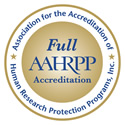Click Here to Go to iRIS if you are already familiar with using the system.
GET HELP: iRIS is the electronic system used by research personnel and the Institutional Review Board (IRB) for the submission and review of research projects that will involve human participants. Individuals who need to use iRIS are strongly encouraged to attend an iRIS training session before using the system for the first time. Please review the training schedule and contact the HSPP at irb@uchc.edu to register for a session. Please register at least five business days prior to the training day.
| IMPORTANT: Individuals affiliated with UConn Health can activate and access their IRIS account using their UConn Health username and password. |
Individuals external to UConn Health should go to iRIS and click the Request Account option, being sure to describe why the account is needed.
Per vendor requirements, training guides may not be posted to the web. User manuals can be found in the Help section of iRIS.
iRIS Frequently Asked Questions:
How do I create an account in iRIS?
UConn Health employees: If you have an active UConn Health username and password, do not request an account. Simply enter your network username and password (what you use to access your UConn Health email or unlock your computer) to log in to iRIS and activate an account.
Individuals external to UConn Health should go to iRIS and click the Request Account option, being sure to describe why the account is needed and noting the name of the UConn Health person with whom they will be working.
How do I access iRIS from outside of UConn Health?
The web location for iRIS is https://imedris.uchc.edu/
How do I add additional email addresses to my iRIS account?
In iRIS, click on My Account Information under the My Assistant tab and you will find the option to add emails under the Profile tab. See instructions in this guide. Note, iRIS correspondence will only go to the Primary account. For UConn Health users that account cannot be changed. The additional email addresses will enable validation of training at external sites or provide the HSPP with another means of contacting the user, if necessary.
Do I need to submit the Principal Investigator’s C.V or biosketch when completing an application in iRIS?
Attachment of the C.V. or biosketch is necessary if the qualifications of the PI are not described within the application.
Who needs to sign the initial submission of an application in iRIS?
The Principal Investigator (PI) and all key study personnel listed on the application are required to electronically sign the initial application. Contact persons and study authors are not required to sign the form if they have no other role on the study.
If the initial application has been returned for corrections from the screening phase, only the person responding to the corrections needs to sign the submission correction form associated to the application. If the initial application has been returned for responses from the official IRB review process, only the PI would need sign the submission response form. If other members of the study team are defaulted to being selected for inclusion in the signature routing process, you can uncheck the box to deselect their names when responding to changes required by the IRB.
Who needs to sign other types of submissions in iRIS?
Continuations, Modifications, Problem Reports Forms and Closure Forms: Only the PI’s electronic signature is required for the submission types of continuation, modification, problem report or study closure. If necessary, manually uncheck the names of the personnel who are not required to provide a signature. When new personnel are being added to the study, they will be asked to sign the form by the IRB as a contingency for approval.
Submission Correction Forms: A submission correction form is generated from the IRB screening process which occurs prior to official review by an IRB member. Only one person needs to sign this form; and it will most often be the person responding to the IRB Contingencies (e.g. a study coordinator).
Submission Response Forms: A submission response form is generated after the IRB has conducted an official review. The PI is the only person required to sign a completed review response form.
Who do I need to list as a study contact in the iRIS application?
The study contacts automatically receive all system generated correspondence (e.g. reminders to request continuations, notifications of lapses in approval, IRB approval letters). The Principal Investigator and Study Coordinator(s) should always be listed in this section; as well as any persons who may be designated to complete IRB submission forms for the study. For studies applying to use resources of the Clinical Research Center (CRC), investigators should add Elizabeth Laska (CRC Nurse Manager) as a study contact. Study contacts must be listed by individual names.
What should I do if I have problems attaching and /or opening documents in iRIS?
If you are unable to open documents and/or upload documents you should make sure that your computer has a compatible browser (Internet Explorer 9.0 browser is preferred) and that the popup blocker setting is off.
How do I know if the IRB has received a submission I completed in iRIS?
To confirm that your submission has been routed by the system to the IRB you can go to your Study Assistant tab, and click on “My Studies.” Then open the study you have completed and submitted. Once you are in the Submission tab, click on the Submission History and then on the Track Location. If the submission has arrived to the IRB queue, you will see the following statement: “UConn Health received the submission.”
If I am adding a modification form in iRIS and the modification includes adding a new person to the study team, does this person need to sign the modification form?
The modification form should be submitted to the IRB with the PI’s signature. The IRB will then accept the personnel change and return the submission with a contingency that the person being added apply their signature.
Should the name of each person obtaining consent be listed in Section 3.2 –B of an initial application in iRIS?
Unless already identified as PI or a co-investigator, yes, every person who will be obtaining consent must be listed in this section.
What documents should I submit with a continuation and/or a modification form?
The documents that are required for submission at continuation can be found on the submission checklist available on the HSPP website. The documents required for a modification are submission specific so a checklist is not available. In general you need to submit the revised version of any previously approved form, any new form not previously approved for use with the study (e.g. new recruitment material), or new information that pertains to the study (e.g. outcomes of meetings of the data safety monitoring board).
What types of documents can I submit in iRIS?
You can attach a variety of document types, however iRIS can only stamp/approve documents that are submitted in Microsoft Words or PDF formats. Furthermore, different documents types sometimes cause problems on the IRB review side, such as corrupting system generated pdf files. Study personnel are strongly encouraged to convert other document types (e.g., excel, jpg, gif, ppt) to a PDF file prior to attaching them to a submission.
Can I work in iRIS using Mozilla Firefox or Chrome?
Internet Explorer 9.0+ is the recommended browser. Internet explorer is the browser used by the IRB and the browser upon which all training materials are based. Per the vendor the system should also be compatible with Safari 6.0, Chrome 30.0+ or Firefox 24.0+. The iRIS home page provides a link that will show compatible browsers.

 The purpose of the Research Financial Compliance Monitoring Program is to provide for continuous monitoring of financial compliance within all clinical research and clinical trials involving human subjects conducted within UConn Health, and to institute an audit plan that identifies and collects information necessary to support the UConn Health research compliance monitoring and audit activities.
The purpose of the Research Financial Compliance Monitoring Program is to provide for continuous monitoring of financial compliance within all clinical research and clinical trials involving human subjects conducted within UConn Health, and to institute an audit plan that identifies and collects information necessary to support the UConn Health research compliance monitoring and audit activities.